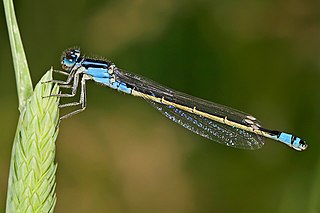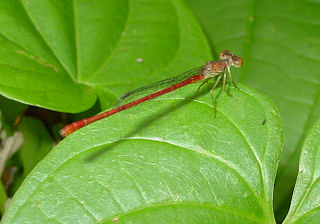
Enallagma cyathigerum is a species found mainly between latitudes 40°N and 72°N; It is widely distributed in the Palearctic, and the Nearctic species Enallagma annexum was at one time considered to be synonymous with it. The species can reach a length of 32 to 35 mm. It is common in many different countries including Russia, Sweden, Norway, Finland, the United States of America, and South Korea. Damselflies are an important link between the health of the aquatic ecosystem and its response to climate change.

Coenagrionidae is a family of damselflies, also known as pond damselflies, in the order Odonata and the suborder Zygoptera. The Zygoptera are the damselflies, which although less known than the dragonflies, are no less common. More than 1,300 species are in this family, making it the largest damselfly family. The family Coenagrionidae has six subfamilies: Agriocnemidinae, Argiinae, Coenagrioninae, Ischnurinae, Leptobasinae, and Pseudagrioninae.

Argia is a genus of damselflies of the family Coenagrionidae and of the subfamily Argiinae. It is a diverse genus which contains about 114 species and many more to be described. It is also the largest genus in Argiinae. They are found in the Western Hemisphere. They are commonly known as dancers. Although the genus name comes from Ancient Greek: ἀργία, romanized: argia, lit. 'laziness', dancers are quite active and alert damselflies. The bluer Argia species may be confused with Enallagma species.

Sympetrum is a genus of small to medium-sized skimmer dragonflies, known as darters in the UK and as meadowhawks in North America. The more than 50 species predominantly live in the temperate zone of the Northern Hemisphere; 15 species are native to North America. No Sympetrum species is native to Australia.

Coenagrion is a genus of damselflies in the family Coenagrionidae, commonly called the Eurasian Bluets. Species of Coenagrion are generally medium-sized, brightly coloured damselflies.

Erpetogomphus is a genus of dragonfly in the family Gomphidae. They are commonly known as ringtails. Most of the species are predominantly green coloured and the males have a moderately clubbed tail. A fossil species are known from the Miocene Mexican amber

Heteragrion is a genus of damselflies in the family Heteragrionidae.

Ischnura is a genus of damselflies known as forktails in the family Coenagrionidae. Forktails are distributed worldwide, including various oceanic islands. The males have a forked projection at the tip of the abdomen which gives the group their common name.

Neoneura is a genus of damselfly in the threadtail family Coenagrionidae. They are found in the Neotropics, from Cuba and Texas to Argentina.

Ophiogomphus, commonly known as snaketails, is a genus of dragonflies in the family Gomphidae. Most of the species in the genus Ophiogomphus have beautifully marked green club-shaped abdomens, which are more noticeable in the males.

Acanthagrion is a genus of damselflies. It is the dominant genus of damselfly at ponds and lakes in the Neotropics but A. quadratum is the only one found in North America. They are commonly known as Wedgetails because of the raised tip of the abdomen.

The marsh bluet is a damselfly species in the family Coenagrionidae.

Nehalennia is a genus of very small damselflies in the family Coenagrionidae. Most of the species are commonly known as Sprites. One species, N. speciosa occurs in Eurasia; the rest in North and South America.

The boreal bluet is a species of damselfly in the family Coenagrionidae.

Enallagma traviatum is a species of small damselfly in the family Coenagrionidae. It is commonly known as the slender bluet. The slender is small about 29–32 mm in length.

Enallagma annexum, the northern bluet, is a species of damselfly in the family Coenagrionidae. Enallagma annexum was formerly included with Enallagma cyathigerum.

Telebasis is a genus of damselflies in the family Coenagrionidae. The genus occurs in the Neotropics. Most of the species are red with a few blue species in South America.

Enallagma minusculum, the little bluet, is a species of narrow-winged damselfly in the family Coenagrionidae. It is found in North America. This species was first described by American entomologist Albert Pitts Morse in 1895.

Enallagma hageni, commonly known as Hagen's bluet, is a species of narrow-winged damselfly in the family Coenagrionidae. It is found in North America.

Enallagma semicirculare, the claw-tipped bluet, is a species of damselfly generally found in Mexico and the southwestern United States. It has also been sighted in southern Texas.




















